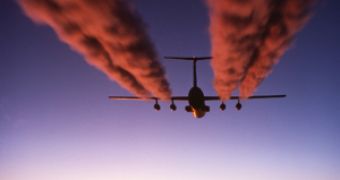According to a new report made public by the World Wildlife Fund, human society can make significant progress in terms of fighting back climate change and global warming by curbing global aircraft emissions.
Furthermore, the organization maintains that, all things considered, greening up the aviation industry is well within our reach.
More precisely, a global system, whose purpose would be that of cutting down on the amounts of aircraft emissions that are produced on a yearly basis, could easily be set up without upsetting the economy.
Not to mention the fact that the modern technologies we now have at our disposal would be more than enough for this system to be a successful one.
“A global system to regulate runaway greenhouse gas emissions from aviation is technically and economically feasible and could help address climate change,” reads the organization’s official website.
As this green-oriented group explains, aviation is, for the time being at least, one of the most emission-intensive form of transport known to our society.
Because of this, it contributes to climate instability and fosters extreme weather manifestations.
The idea to green up the aviation industry has been around for roughly a decade now without anybody actually giving it the attention it deserves.
Still, the Wold Wildlife Fund hopes that its rolling out this report ahead of a meeting of the High Level Group established by the International Civil Aviation Organization will help change things for the better.
“[Our report] outlines four options, and weighs their pros and cons, to develop a global system to regulate emissions from aircraft. These include offsetting, offsetting with a revenue generating mechanism, a cap and trade emissions trading system, and a levy with offsetting,” the organization explains.
Furthermore, “The report finds that the latter three options can both cut pollution at the least cost to industry, and also generate funds that could be used to support global efforts to address climate change, while maintaining a level playing field between airlines.”
Hopefully, its proposal will be given due consideration.

 14 DAY TRIAL //
14 DAY TRIAL //